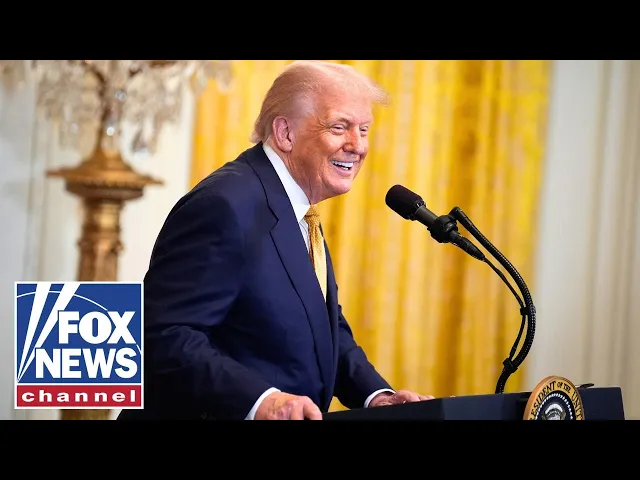President Trump delivers remarks and signs executive orders at an AI summit

AI takes White House spotlight under Trump
In a striking shift of national priorities, former President Donald Trump gathered tech industry leaders for a significant artificial intelligence summit at his Mar-a-Lago estate, signing two executive orders that signal a potential transformation in America's approach to AI development. The event, bringing together luminaries like Elon Musk alongside other tech executives, represents Trump's most substantial engagement with artificial intelligence policy to date and offers a preview of how a second Trump administration might position the United States in the global AI race.
Trump's remarks reveal a leader newly focused on artificial intelligence as both an economic imperative and national security concern. Against the backdrop of his Florida resort, Trump articulated a vision where American AI development would proceed with minimal regulatory interference while simultaneously receiving robust government support. This approach stands in notable contrast to the Biden administration's more cautious regulatory framework and reflects Trump's longstanding preference for business-friendly policies, now applied to perhaps the most consequential technology of our era.
Key insights from Trump's AI summit:
-
Trump is positioning AI development as a matter of national pride and security, framing American leadership in this space as non-negotiable while characterizing China's AI ambitions as a direct threat requiring an aggressive competitive response.
-
The executive orders establish an "AI Safety Board" with significant authority and aim to prevent "job-killing AI regulations" that Trump claims have hampered innovation during the Biden administration.
-
Trump appears to be courting the tech industry aggressively, promising both regulatory relief and potential government investment while framing himself as uniquely positioned to understand the balance between innovation and necessary guardrails.
The pivot to AI as political strategy
The most revealing aspect of this summit isn't found in the policy details but in the political recalibration it represents. Trump's previous term showed limited engagement with AI policy compared to other priorities, but this high-profile event signals a recognition that artificial intelligence has moved from a niche technical concern to a mainstream political issue that resonates with voters concerned about economic disruption and national competitiveness.
This pivot matters tremendously in the current landscape. AI has rapidly evolved from an abstract future technology to an immediate economic and cultural force, with generative AI tools now used by millions of Americans daily. By framing AI development as both an economic opportunity and national security imperative, Trump is attempting to capture the narrative around a technology
Recent Videos
How To Earn MONEY With Images (No Bullsh*t)
Smart earnings from your image collection In today's digital economy, passive income streams have become increasingly accessible to creators with various skill sets. A recent YouTube video cuts through the hype to explore legitimate ways photographers, designers, and even casual smartphone users can monetize their image collections. The strategies outlined don't rely on unrealistic promises or complicated schemes—instead, they focus on established marketplaces with proven revenue potential for image creators. Key Points Stock photography platforms like Shutterstock, Adobe Stock, and Getty Images remain viable income sources when you understand their specific requirements and optimize your submissions accordingly. Specialized marketplaces focusing...
Oct 3, 2025New SHAPE SHIFTING AI Robot Is Freaking People Out
Liquid robots will change everything In the quiet labs of Carnegie Mellon University, scientists have created something that feels plucked from science fiction—a magnetic slime robot that can transform between liquid and solid states, slipping through tight spaces before reassembling on the other side. This technology, showcased in a recent YouTube video, represents a significant leap beyond traditional robotics into a realm where machines mimic not just animal movements, but their fundamental physical properties. While the internet might be buzzing with dystopian concerns about "shape-shifting terminators," the reality offers far more promising applications that could revolutionize medicine, rescue operations, and...
Oct 3, 2025How To Do Homeless AI Tiktok Trend (Tiktok Homeless AI Tutorial)
AI homeless trend raises ethical concerns In an era where social media trends evolve faster than we can comprehend them, TikTok's "homeless AI" trend has sparked both creative engagement and serious ethical questions. The trend, which involves using AI to transform ordinary photos into images depicting homelessness, has rapidly gained traction across the platform, with creators eagerly jumping on board to showcase their digital transformations. While the technical process is relatively straightforward, the implications of digitally "becoming homeless" for entertainment deserve careful consideration. The video tutorial provides a step-by-step guide on creating these AI-generated images, explaining how users can transform...
